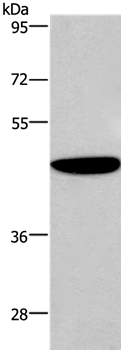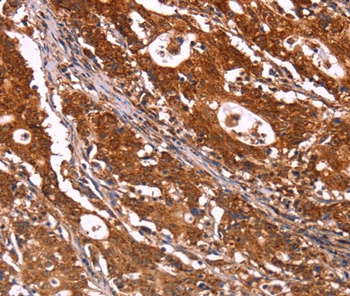Product Detail
Product NameABI1 Antibody
Host SpeciesRabbit
ClonalityPolyclonal
PurificationAntigen affinity purification.
ApplicationsWB IHC
Species ReactivityHu Ms Rt
SpecificityThe antibody detects endogenous levels of total ABI1 protein.
Immunogen TypePeptide
Immunogen DescSynthetic peptide corresponding to residues near the C terminal of human abl-interactor 1
Target NameABI1
ConjugateUnconjugated
Other NamesE3B1; ABI-1; ABLBP4; NAP1BP; SSH3BP; SSH3BP1
Accession NoSwiss-Prot#: Q8IZP0
NCBI Gene ID: 10006
Gene Accssion: NP_005461
Uniprot
Q8IZP0
Gene ID
10006;
Sdspage MW55kd
Concentration2.3mg/ml
FormulationRabbit IgG in pH7.4 PBS, 0.05% NaN3, 40% Glycerol.
StorageStore at -20˚C
Application Details
Western blotting: 1:500-1:2000
Immunohistochemistry: 1:50-1:200
Gel: 8%SDS-PAGE
Lysates (from left to right): Human fetal brain tissue
Amount of lysate: 40ug per lane
Primary antibody: 1/300 dilution
Secondary antibody dilution: 1/8000
Exposure time: 20 seconds
Immunohistochemical analysis of paraffin-embedded Human gastric cancer tissue using #36723 at dilution 1/40.
This gene encodes a member of the Abelson-interactor family of adaptor proteins. These proteins facilitate signal transduction as components of several multiprotein complexes, and regulate actin polymerization and cytoskeletal remodeling through interactions with Abelson tyrosine kinases. The encoded protein plays a role in macropinocytosis as a component of the WAVE2 complex, and also forms a complex with EPS8 and SOS1 that mediates signal transduction from Ras to Rac. This gene may play a role in the progression of several malignancies including melanoma, colon cancer and breast cancer, and a t(10;11) chromosomal translocation involving this gene and the MLL gene has been associated with acute myeloid leukemia. Alternatively spliced transcript variants encoding multiple isoforms have been observed for this gene, and a pseudogene of this gene is located on the long arm of chromosome 14
If you have published an article using product 36723, please notify us so that we can cite your literature.
et al,Proteomic characteristics reveal the signatures and the risks of T1 colorectal cancer metastasis to lymph nodes
, (2023),
PMID:
37158593




 Yes
Yes



